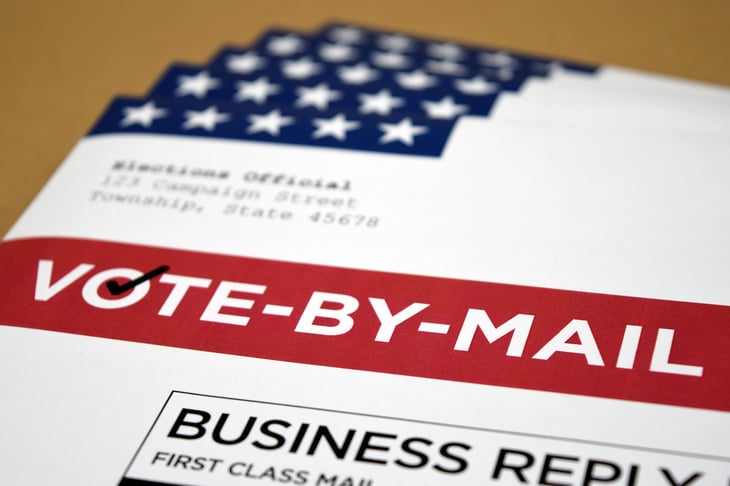
As the coronavirus continues to spread across the U.S., state governments have been making plans for safely and securely voting remotely in this fall’s elections.
For some states, voting by mail is the normal way elections are done — business as usual. Others have wrestled with the idea of the pandemic being a valid reason to request an absentee ballot.
A new study from the Brookings Institution takes a state-by-state look at America’s evolving mail-in voting policies and gives every state a score and a grade for how prepared they are for voting in a pandemic.
While a handful of states currently score an A, C is the most common grade — and one state earned a big, fat F. Read on to see how your state fared.
Washington

Grade: A
Score: 22 out of 22 points
Washington is one of only three states that received a perfect score in the category of universal vote-by-mail, which the Brookings Institute based on whether voters automatically receive a ballot (worth up to 10 points) and whether the state offered universal vote-by-mail for the 2016 election (worth up to 3 points).
Colorado
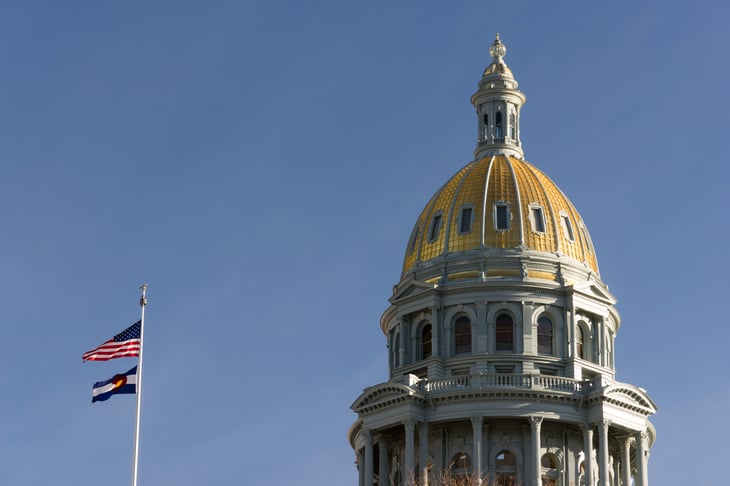
Grade: A
Score: 19 out of 22 points
Along with Washington and the next state on this list, Colorado is one of only three states that received a perfect score in the category of universal vote-by-mail. Colorado voters automatically receive a ballot, and the state offered universal vote-by-mail in 2016.
Oregon

Grade: A
Score: 19 out of 22 points
Like Washington and Colorado, the state of Oregon received a perfect score in the category of universal vote-by-mail. Passage of a citizens initiative in 1998 made Oregon the first state to conduct its elections exclusively by mail.
Utah

Grade: A
Score: 19 out of 22 points
Like the previously mentioned states, Utah automatically provides for universal vote-by-mail by sending all voters a ballot. Utah sits in a four-way tie of states scoring 19 points for their level of preparedness.
Washington, D.C.
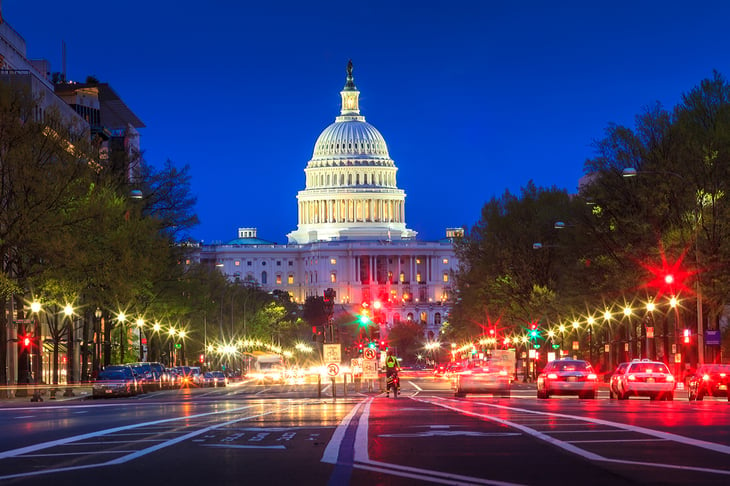
Grade: A
Score: 19 out of 22 points
Like Washington state, Washington, D.C., will provide all voters with a ballot to mail in or drop off by Election Day — but it didn’t do so in 2016.
California

Grade: A
Score: 18 out of 22 points
California will offer universal vote-by-mail this year, but like Washington, D.C., it did not in 2016.
Such states may be less prepared to handle mail-in voting on a large scale than states that have a tradition of doing so.
Nevada
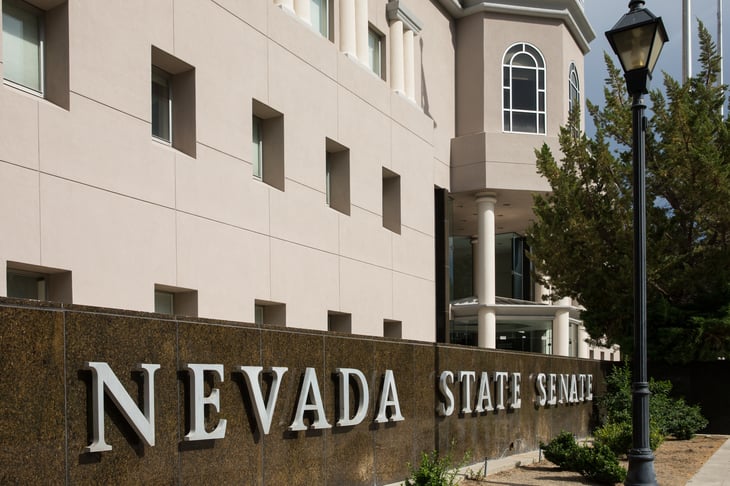
Grade: A
Score: 18 out of 22 points
Nevada will offer universal vote-by-mail this year, getting full credit on the single-most-valuable criteria in Brookings’ scoring.
Hawaii

Grade: A
Score: 16 out of 22 points
Hawaii is the last state on the list to receive an A grade thanks to its universal vote-by-mail policy. However, it didn’t get any points in the “submitting a mail ballot category,” which were granted for states that accept ballots based on their postmark date.
Maryland

Grade: B
Score: 15 out of 22 points
Maryland this fall will automatically send all registered voters an application to receive a ballot for absentee voting, a move that’s worth 5 points on the Brookings scorecard. This involves an extra step for voters that residents in states with universal mail-in voting don’t have to deal with.
Ohio
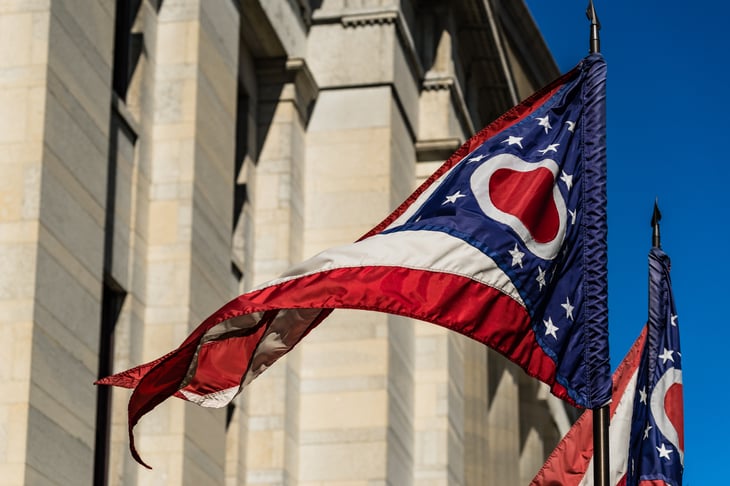
Grade: B
Score: 15 out of 22 points
Ohio sits in a three-way tie of states scoring 15 points. The biggest chunk of that comes from all registered Ohio voters automatically receiving an application for absentee voting.
Vermont

Grade: B
Score: 15 out of 22 points
Like Ohio and Maryland, Vermont scored 15 points. But those points come from different categories, as Vermont will offer universal vote-by-mail, providing each registered voter with a ballot.
Illinois
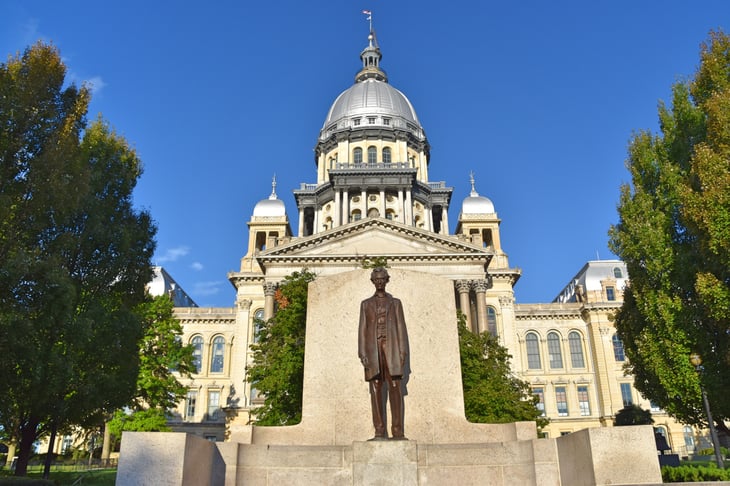
Grade: B
Score: 14 out of 22 points
All registered voters in Illinois will automatically receive an application for an absentee ballot this fall.
For those counting, Illinois ranks 12th on this list and is the only state to score 14 points.
Iowa
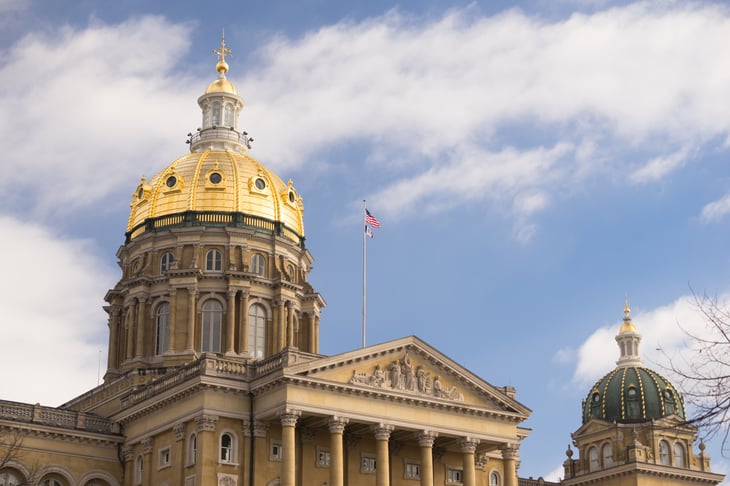
Grade: B
Score: 13 out of 22 points
All registered voters in Iowa will automatically receive an application for absentee voting. In the Hawkeye state, ballots postmarked by Election Day and received within five days of it will be accepted.
Massachusetts

Grade: B
Score: 13 out of 22 points
All registered voters in Massachusetts will automatically receive an application for absentee voting, and ballots postmarked by Election Day and received within five days of it will be accepted.
Delaware
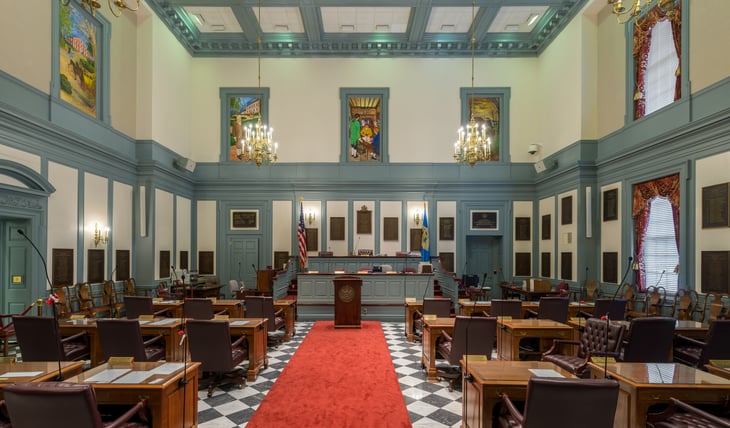
Grade: B
Score: 12 out of 22 points
All registered voters in Delaware will automatically receive an application for absentee voting, and mailed ballots do not require a witness signature.
Michigan

Grade: B
Score: 12 out of 22 points
All registered voters in Michigan will automatically receive an application for absentee voting, and mailed ballots don’t require a witness signature.
Minnesota

Grade: B
Score: 11 out of 22 points
Minnesota will offer “no excuse” absentee voting, meaning any registered voter can request an application for an absentee ballot without providing a reason. Ballots are accepted if postmarked by Election Day, even if they are received more than five days after the election.
Nebraska

Grade: B
Score: 11 out of 22 points
Nebraska will also offer “no excuse” absentee voting, meaning any registered voter can request an application for an absentee ballot without providing a reason. No witness signature is required on mailed ballots in Nebraska.
North Dakota

Grade: B
Score: 11 out of 22 points
In North Dakota, any registered voter can get an application for absentee voting without providing an excuse. Mailed ballots are accepted if postmarked by Election Day, even if they are received more than five days after the election.
West Virginia

Grade: B
Score: 11 out of 22 points
In West Virginia, any registered voter can get an application for absentee voting without providing an excuse. Mailed ballots don’t require a witness signature, and they are accepted if postmarked by Election Day, even if received more than five days after the election.
Kansas

Grade: B
Score: 10 out of 22 points
In Kansas, any registered voter can get an application for absentee voting without giving an excuse, and ballots postmarked by Election Day and received within five days of it will be accepted.
New Jersey

Grade: B
Score: 10 out of 22 points
In New Jersey, any registered voter can get an application for absentee voting without an excuse, and ballots postmarked by Election Day will be accepted, even if they are received more than five days after the election.
North Carolina

Grade: B
Score: 10 out of 22 points
North Carolina is the last state on the list to receive a B grade. It will send every registered voter an application for absentee voting.
Alaska

Grade: C
Score: 9 out of 22 points
Alaska will offer “no excuse” absentee voting, meaning any voter can request an application for an absentee ballot without giving a reason. Ballots postmarked by Election Day and received within five days of it will be accepted.
Arizona

Grade: C
Score: 9 out of 22 points
Arizona will offer “no excuse” absentee voting, meaning any voter can request an application for an absentee ballot. It also receives points from Brookings for not requiring witness signatures on the ballot.
Georgia

Grade: C
Score: 9 out of 22 points
Like Arizona, Georgia will offer “no excuse” absentee voting, meaning any voter can request an absentee ballot, and the state does not require witness signatures on the ballot.
New York

Grade: C
Score: 9 out of 22 points
New York received no points from Brookings for making ballot applications easier for voters, but got credit for other basic steps including offering multiple channels for acquiring an absentee ballot and submitting one.
It will also accept ballots postmarked by Election Day, even if they arrive more than five days later.
Florida

Grade: C
Score: 8 out of 22 points
Florida will offer “no excuse” absentee voting, meaning any voter can request an application for an absentee ballot, and the state does not require witness signatures on the ballot.
However, it lost a point on the Brookings scorecard for requiring a copy of photo ID to get an application and/or a ballot. That’s one of three areas where points could be deducted from a state’s score.
Maine
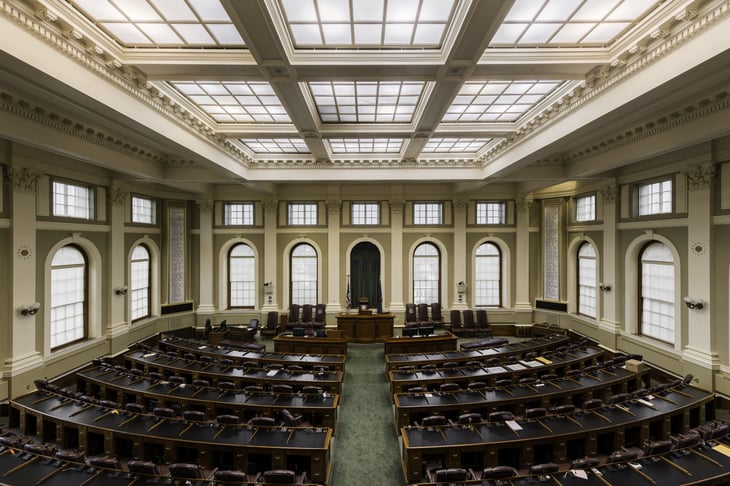
Grade: C
Score: 8 out of 22 points
Maine will offer “no excuse” absentee voting, meaning any voter can request an application for an absentee ballot, and it does not require voters to provide witness signatures on the ballot.
New Mexico

Grade: C
Score: 8 out of 22 points
One of five states to receive a score of 8 points, New Mexico will offer “no excuse” absentee voting and does not require witness signatures on the ballot.
Pennsylvania

Grade: C
Score: 8 out of 22 points
Pennsylvania will offer “no excuse” absentee voting and does not require witness signatures on the ballot.
Wyoming
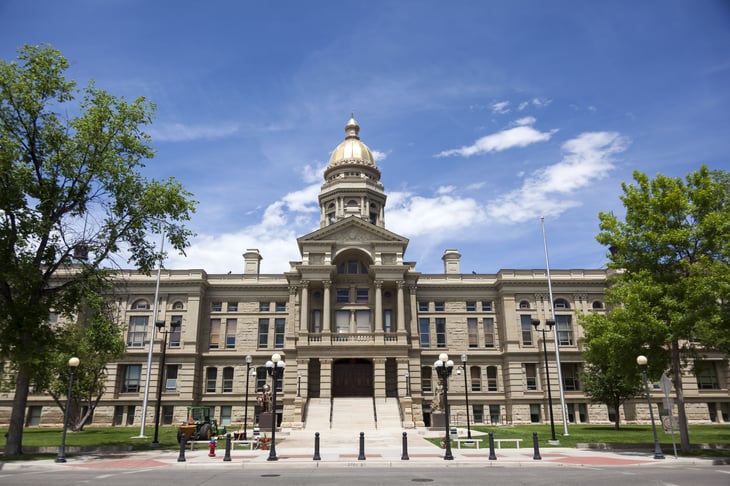
Grade: C
Score: 8 out of 22 points
Wyoming will also offer “no excuse” absentee voting and does not require witness signatures on the ballot.
Idaho

Grade: C
Score: 7 out of 22 points
Idaho, too, will offer “no excuse” absentee voting, and it does not require witness signatures on the ballot.
Oklahoma

Grade: C
Score: 7 out of 22 points
In Oklahoma, any registered voter can get an application for absentee voting without providing an excuse.
Completed ballots do not require a witness signature, but voters are instead required to provide a copy of a photo ID to get a ballot, a requirement that cost the state 1 point.
Rhode Island

Grade: C
Score: 7 out of 22 points
Idaho, too, will offer “no excuse” absentee voting. It does not require witness signatures on the ballot.
Texas
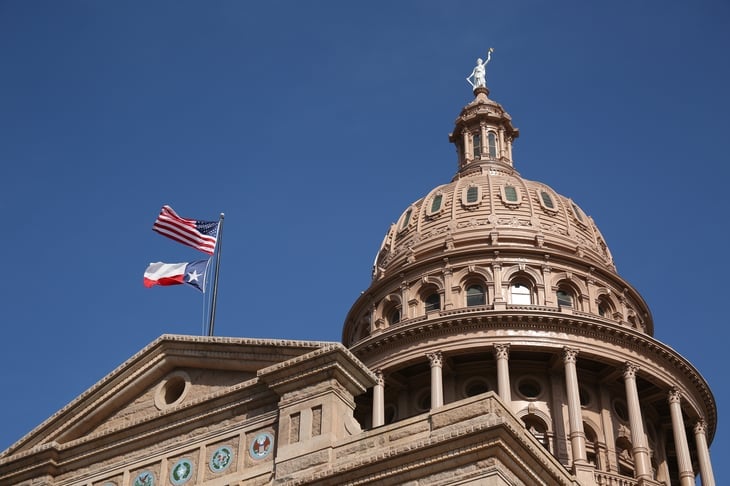
Grade: C
Score: 7 out of 22 points
Texas received no points from Brookings for making applications easier for voters and lost a point for requiring photo ID for either an application or a ballot.
However, mailed ballots don’t require a witness signature and will be counted if postmarked by Election Day and received within five days of it.
Wisconsin

Grade: C
Score: 7 out of 22 points
Wisconsin is one of five states that scored 7 points. It will send all registered voters an application for an absentee ballot, but a photo ID is required to get the ballot.
Arkansas
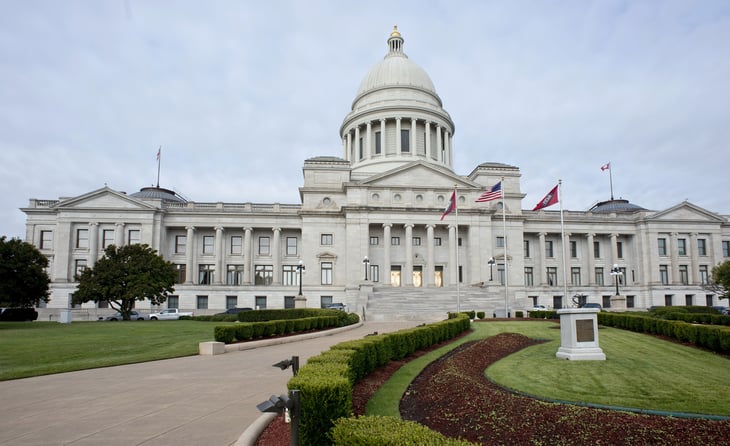
Grade: C
Score: 6 out of 22 points
Arkansas will allow voters to cite COVID-19 concerns as a reason to request an absentee ballot, but a photo ID is required to get the ballot.
Connecticut

Grade: C
Score: 6 out of 22 points
Connecticut will also allow voters to cite COVID-19 concerns as a reason they are seeking an absentee ballot, and a witness signature is not required on the ballot.
South Dakota

Grade: C
Score: 6 out of 22 points
South Dakota offers “no excuse” absentee voting, but requires a photo ID to submit a completed ballot.
Tennessee
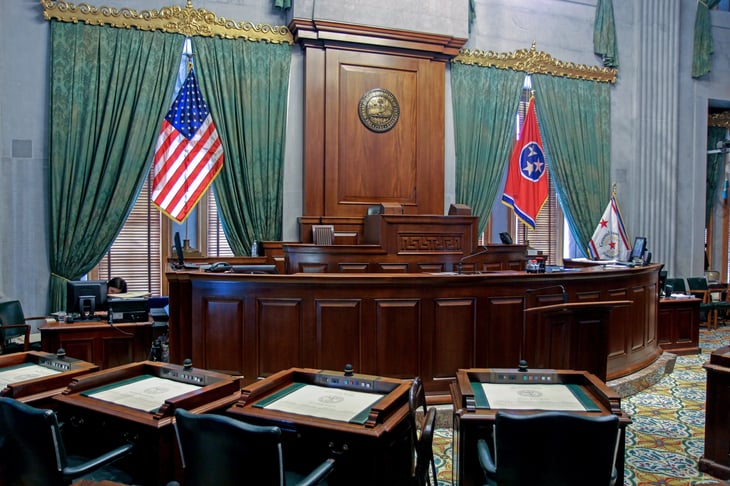
Grade: C
Score: 6 out of 22 points
Rounding out the list of “C” grades is Tennessee, where absentee ballots do not require signatures.
Indiana

Grade: D
Score: 5 out of 22 points
Indiana mail-in ballots do not require witness signatures, but Brookings subtracted a point from the state scorecard because mailed ballots must be received before the close of polling.
New Hampshire

Grade: D
Score: 5 out of 22 points
New Hampshire allows COVID-19 concerns as a reason for absentee voting, but like Indiana, the state demands mailed ballots arrive before the close of polling.
Virginia

Grade: D
Score: 5 out of 22 points
Virginia offers “no excuse” absentee voting and makes applications available through three or more channels. However, the state is one of three to garner just 5 points.
Kentucky
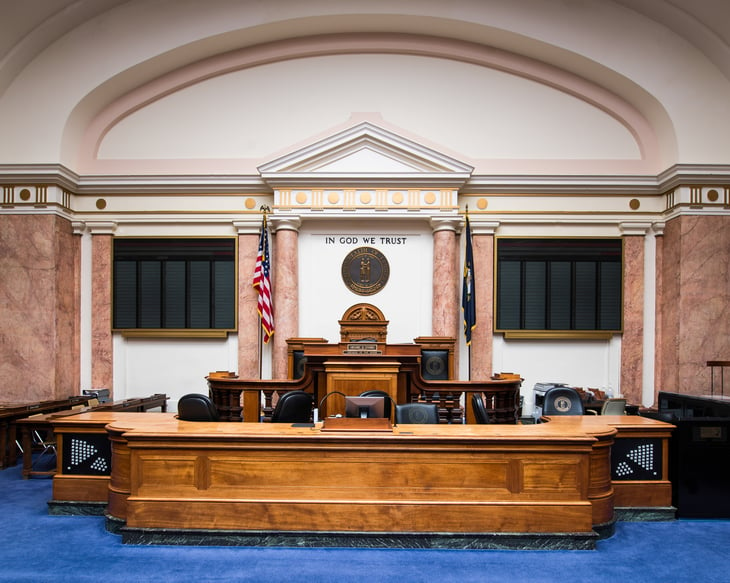
Grade: D
Score: 4 out of 22 points
Kentucky does not require witness signatures on ballots and makes applications available through three or more channels, but does nothing else that earns credit from Brookings.
Montana

Grade: D
Score: 4 out of 22 points
Montana offers “no excuse” absentee voting.
South Carolina
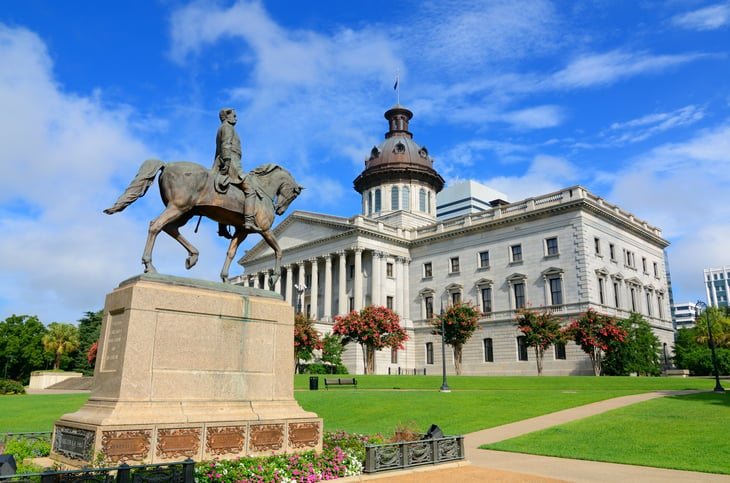
Grade: D
Score: 3 out of 22 points
South Carolina’s only points on the scorecard come from offering mail and in-person options to submit an absentee ballot and multiple ways to apply for one.
Louisiana

Grade: D
Score: 2 out of 22 points
Like South Carolina, Louisiana offers mail and in-person options to submit an absentee ballot and multiple ways to apply for one. However, ballots are due before close of polling, costing the state 1 point from Brookings.
Mississippi
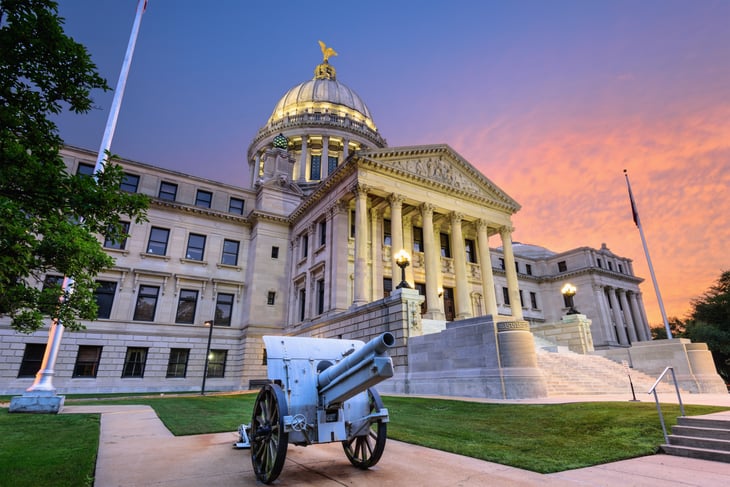
Grade: D
Score: 2 out of 22 points
Mississippi accepts COVID-19 concerns on a request for absentee voting, and the state will accept absentee ballots postmarked by Election Day and received within five days of it. But the state requires a notary or two witnesses on absentee ballots, costing it a point from Brookings.
Missouri

Grade: D
Score: 0 out of 22 points
The last of the “D” grades, Missouri offers “no excuse” absentee voting and more than one channel to submit a ballot, but demands a notary or two witness signatures to complete an absentee ballot. So, the points offered by Brookings for the first two are canceled out by the points deducted for the third.
Alabama
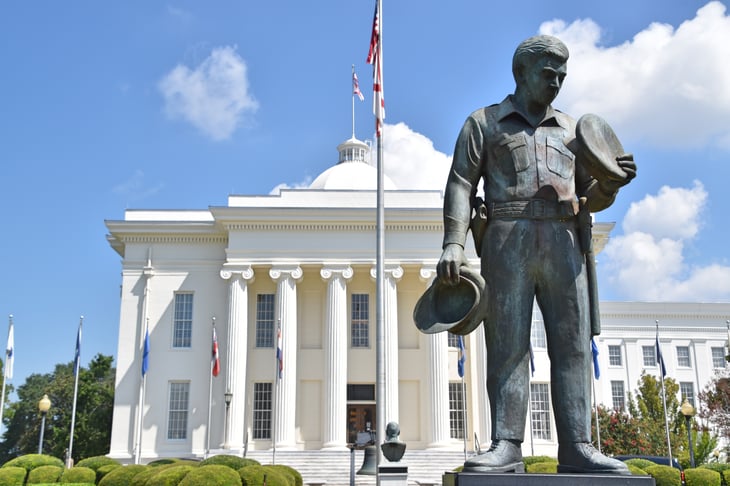
Grade: F
Score: -1 out of 22 points
Alabama is the only state to get an F grade and the only state to receive a negative score.
It does some things many “D” states do not, including allowing COVID-19 concerns as a reason to request an absentee ballot and providing drop-off boxes, mail and in-person submission options.
However, it also loses points in every category possible by requiring: a copy of photo ID for a mail application and/or ballot, a notary or two witnesses to complete a ballot, and the return of mail ballots by close of polling.








Add a Comment
Our Policy: We welcome relevant and respectful comments in order to foster healthy and informative discussions. All other comments may be removed. Comments with links are automatically held for moderation.